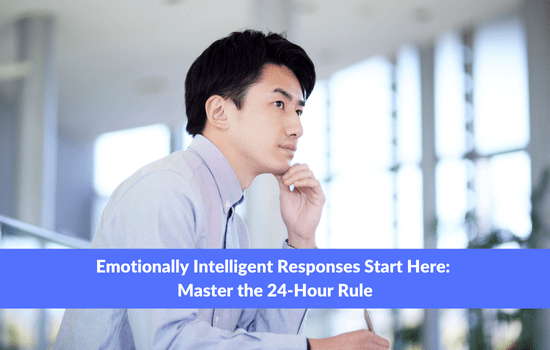Ever feel your heart race after a frustrating email or tense conversation? Emotional triggers are natural, but how we manage them is key to strong self-management and emotional regulation. The 24-hour rule, a strategy rooted in emotional intelligence, empowers us to pause, reflect, and respond in a rational, thoughtful way, rather than reacting on impulse..
The 24-Hour Rule: Your Secret Weapon for Emotional Regulation and Self-Management
Emotional triggers are a natural part of being human, but how we respond to them makes all the difference. In critical moments, pausing and reflecting isn't just a soft skill; it's a sign of strong self-management.

That's where the 24-hour rule comes in: a simple yet transformative strategy that supports emotional regulation by giving you time to calm your nervous system, gather your thoughts, and offer a well-grounded, rational response. This technique is rooted in emotional intelligence—the ability to recognize, understand, and manage our emotions and the emotions of others. With intentional effort and a commitment to this practice, we can shift from reacting on impulse to responding with clarity and purpose.
Why Emotional Intelligence Matters
According to TalentSmart, 90% of top performers have high emotional intelligence (EI), while only 20% of low performers do. This statistic alone highlights just how crucial EI is, not only in the workplace but in all areas of life. Emotional intelligence encompasses several core skills, including self-awareness, self-management, social awareness, and relationship management.
When we fail to manage our emotional responses, we risk damaging relationships, undermining trust, and making decisions we later regret. But by practicing emotional regulation, we can navigate difficult moments with confidence and composure.
The Cost of Reacting Too Quickly
Think back to a moment that stirred your emotions, maybe someone asked a question that felt too personal, or you received an upsetting message. Our brain's natural response to emotional triggers is to protect us. We may feel defensive, angry, or hurt. This immediate surge of emotion is often referred to as being emotionally hijacked, a term coined by psychologist Daniel Goleman, author of Emotional Intelligence.
Here's the science behind it: emotions are processed first in the brain's limbic system, our emotional center, before they reach the frontal lobe, where logic and reason reside. This means our emotional response is quicker than our rational one, and without awareness, we may act before we've truly thought things through.
The Power of the 24-Hour Rule
That's why the 24-hour rule is such a valuable strategy. Simply put, it's the practice of delaying your response to a triggering situation for a full day, or at least long enough for your emotional intensity to decrease. Whether it's a difficult conversation, a tough email, or a confrontation, giving yourself time allows you to return to the situation with a clear head.
During that pause, use self-management techniques such as:
-
Taking several deep breaths
-
Journaling your initial emotions
-
Talking it through with a trusted friend or coach
-
Saying, "I need time to think this through. I'll get back to you."
Even a short pause can prevent a rash reaction and create space for a rational response that reflects your values and emotional maturity.
How Emotional Regulation Elevates Leadership
Leaders who consistently demonstrate emotional regulation cultivate environments grounded in psychological safety, trust, and mutual respect. According to Harvard Business Review, emotionally intelligent leadership significantly boosts employee engagement and productivity. By applying tools like the 24-hour rule, leaders model composure in the face of conflict and stress, setting the tone for a healthier, more responsive workplace culture.
But this approach isn’t just for leaders. Whether you're managing client tension, family dynamics, or team conflict, choosing to pause before reacting gives you a distinct advantage. The 24-hour rule empowers you to respond with intention rather than emotion.
When practiced consistently, this strategy strengthens emotional regulation, enhances self-management, and deepens emotional intelligence. The result? Clearer communication, healthier relationships, and more confident decision-making, both professionally and personally.
Ready to Lead with Emotional Intelligence?
The next time you feel emotionally triggered, pause, breathe, and give yourself the gift of time. That space could be the turning point between regret and a response you're proud of.
Curious about where you stand with your emotional intelligence skills? Consider taking an emotional intelligence assessment and working with a certified coach. It’s a powerful first step toward improving how you lead, live, and connect. Want to dive deeper? Explore The Power of Emotion, a practical guide to leveraging your emotions to drive meaningful growth in all areas of life.
This article was originally published on June 2, 2018, and has been updated (April 2025).
More Motivational Reads Here »
How Emotionally Intelligent Are You?
Sign up for Linda’s monthly tips to build your Emotional Intelligence and reduce Emotional Hijacking!

















